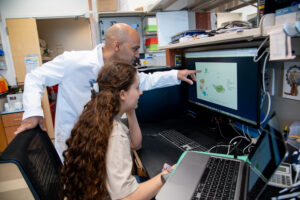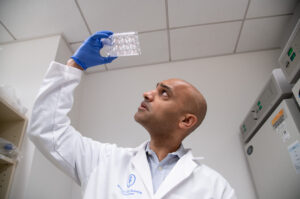Santosha Vardhana, MD, PhD ‹ Back To 2024 Winners
2024 Winners
Assistant Attending/Member
Human Oncology and Pathogenesis Program
Memorial Sloan Kettering Cancer Center
Vision
CD8+ T-cells infiltrating developing tumors sequentially acquire functional defects, including loss of proliferative capacity, cytotoxic granule production, and bioenergetic homeostasis, described collectively as T-cell “exhaustion.” The molecular drivers of T-cell exhaustion remain poorly understood and remain a fundamental barrier to cancer immunotherapy. We uncovered a surprising de-repression of transposable elements – mobile genetic elements whose expression is typically silenced – in up to half of tumor-infiltrating T-cells across cancer types. Our vision is to understand how transposable elements alter T-cell function within tumors with the goal of developing novel therapeutic strategies to restore immune-mediated cancer surveillance.
Dr. Santosha (Santosh) Vardhana is an attending physician on the Lymphoma Service at Memorial Sloan Kettering Cancer Center and a member of the Human Oncology and Pathogenesis Program. Santosh completed his MD and PhD at New York University School of Medicine, where his thesis focused on T-cell receptor-mediated signal transduction in the laboratory of Michael Dustin. He completed his internal medicine residency training at New York Presbyterian Hospital/Weill-Cornell Medical college, where he was selected as both Intern and Junior Resident of the year during his two years of training. Santosh completed his medical oncology training at Memorial Sloan Kettering Cancer Center and served as chief medical oncology fellow in 2015. He conducted his post-doctoral training in the laboratory of Craig Thompson, President and CEO of MSKCC; during this time Santosh made seminal insights into how cellular metabolites regulate the differentiation and function of both stem cells and T-cells. Dr. Vardhana established his independent laboratory in 2021, and immediately advanced understanding of immune dysregulation in cancer patients with COVID-19. His laboratory focuses on immune dysregulation in cancer and chronic infections, with a particular emphasis on how cellular metabolism influences immune responses. Dr. Vardhana has received an NCI K08 Career Development Award, Burroughs Wellcome Fund Career Award for Medical Scientists, Damon Runyon Clinical Investigator Award, and V Foundation Scholar Award, and his laboratory has received funding from Cycle for Survival, the Leukemia and Lymphoma Society, the Parker Institute for Cancer Immunotherapy, and the Lymphoma Research Foundation.
Metabolic regulation of anti-tumor immunity by non-coding RNAs
 The primary function of the immune system is to recognize and clear foreign elements within the host. Cytotoxic T-cells execute this response by releasing granules containing toxic proteins that kill tumor or virus-infected cells upon recognition. Cancers that successfully develop within the host must therefore evade recognition by the host immune system. This phenomenon is best illustrated by the “Hellstrom Paradox,” described by the late Ingegerd Hellstrom in 1964, when she noted that immune cells were abundantly present within tumors but unable to prevent their growth. Over the past twenty years, the molecular causes of T-cell dysfunction within tumors have been extensively studied. Efforts to reverse this dysfunction, either by genetically modifying immune cells to better recognize cancer cells or by blocking inhibitory signals present on of immune cell surfaces, have shown substantial clinical promise but general fail due to an inability to ‘reawaken’ T-cell function.
The primary function of the immune system is to recognize and clear foreign elements within the host. Cytotoxic T-cells execute this response by releasing granules containing toxic proteins that kill tumor or virus-infected cells upon recognition. Cancers that successfully develop within the host must therefore evade recognition by the host immune system. This phenomenon is best illustrated by the “Hellstrom Paradox,” described by the late Ingegerd Hellstrom in 1964, when she noted that immune cells were abundantly present within tumors but unable to prevent their growth. Over the past twenty years, the molecular causes of T-cell dysfunction within tumors have been extensively studied. Efforts to reverse this dysfunction, either by genetically modifying immune cells to better recognize cancer cells or by blocking inhibitory signals present on of immune cell surfaces, have shown substantial clinical promise but general fail due to an inability to ‘reawaken’ T-cell function.
“While treatments that reinvigorate the immune system to target cancer have shown promise, they fail to reawaken patients’ immune systems in most cases. The Pershing Square Sohn Prize will allow us to explore how non-coding RNA – the ‘dark matter’ of the genome – sets T-cells on a dysfunctional trajectory in tumors and how targeting non-coding RNA can restore anti-tumor immunity.”

Our laboratory recently found that the ability of T-cells to produce energy derived from nutrients becomes limited within tumors, and this bioenergetic limitation is a key driver of their dysfunction. We have since found that these T-cells reactivate dormant sequences within their genetic code, known as ‘transposable elements,’ which may be the missing link connecting T-cell metabolism to functional T-cell failure within tumors. In the proposed work, we will explore how reactivation of transposable elements serves as a novel ‘break’ on T-cell function within tumors, and whether targeting this newly discovered regulatory axis can restore T-cell function and anti-tumor immunity.
“For decades, the fact that all cells consume and produce the same set of metabolites led to the flawed assumption that cellular metabolism was a field bereft of innovation. We now realize that cells are able to use a common set of metabolites to produce endless diversity, and so we as scientists must be similarly unbound as we explore
how metabolic pathways can direct human health and disease.”